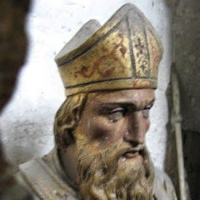Easter: May 28th
Friday of the Seventh Week of Easter
Other Commemorations: St. Germanus, Bishop (RM); Bl. Margaret Pole, Mother and Martyr (RM)
» Enjoy our Liturgical Seasons series of e-books!
"'Simon son of John, do you love me more than these others do?' He answered, 'Yes Lord, you know I love you.'" "There cannot be a more sure means of pleasing Jesus, of manifesting to Him that absolute love which He alone merits, than in ever seeking 'with most fervent love' to do the will of His Father Who is also ours; in keeping united to Him, the Father's Beloved Son; and in striving to reproduce in ourselves the dispositions of reverence and love for His Father, of charity for our brethren, of humility and obedience which animated His blessed soul here below." — Christ the Ideal of the Monk, Dom Columba Marmion
Before the reform of the General Roman Calendar today was the feast of St. Augustine of Canterbury. His feast is now celebrated on May 27.
St. Germanus
 St. Germanus, the glory of the Church of France in the sixth century, was born in the territory of Autun, about the year 496. In his youth he was conspicuous for his fervor. Being ordained priest, he was made abbot of St. Symphorian's; he was favored at that time with the gifts of miracles and prophecy. It was his custom to watch the great part of the night in the church in prayer, whilst his monks slept.
St. Germanus, the glory of the Church of France in the sixth century, was born in the territory of Autun, about the year 496. In his youth he was conspicuous for his fervor. Being ordained priest, he was made abbot of St. Symphorian's; he was favored at that time with the gifts of miracles and prophecy. It was his custom to watch the great part of the night in the church in prayer, whilst his monks slept.
One night, in a dream, he thought a venerable old man presented him with the keys of the city of Paris, and said to him that God committed to his care the inhabitants of that city, that he should save them from perishing.
Four years after this divine admonition, in 554, happening to be at Paris when that see became vacant on the demise of the Bishop Eusebius, he was exalted to the episcopal chair, though he endeavored by many tears to decline the charge. His promotion made no alteration in his mode of life. The same simplicity and frugality appeared in his dress, table, and furniture. His house was perpetually crowded with the poor and the afflicted, and he had always many beggars at his own table. God gave to his sermons a wonderful influence over the minds of all ranks of people; so that the face of the whole city was in a very short time quite changed.
King Childebert, who till then had been an ambitious, worldly prince, was entirely converted by the sweetness and the powerful discourses of the Saint, and founded many religious institutions, and sent large sums of money to the good bishop, to be distributed among the indigent.
In his old age St. Germanus lost nothing of that zeal and activity with which he had filled the great duties of his station in the vigor of his life; nor did the weakness to which his corporal austerities had reduced him make him abate anything in the mortifications of his penitential life, in which he redoubled his fervor as he approached nearer to the end of his course. By his zeal, the remains of idolatry were extirpated in France.
The Saint continued his labors for the conversion of sinners till he was called to receive the reward of them, on the 28th of May, 576, being eighty years old.
—Excerpted from The Daily Gospel
Highlights and Things to Do:
- Read more about St. Germanus:
- Read about the oldest church in Paris, Abbaye de St Germain-des-Près.
Bl. Margaret Pole
 Margaret was born into the ruling dynasty in 1473, at Farleigh Hungerford, in Somerset. Her father, the Duke of Clarence, was brother to both Edward IV and Richard III. This meant that all her life she was seen as a threat to the ruling monarchs, as she had a legitimate claim to the throne and was therefore a potential figurehead in any revolt against the crown. Indeed as soon as the Tudors came to power they imprisoned Margaret's brother, the Earl of Warwick, and eventually executed him.
Margaret was born into the ruling dynasty in 1473, at Farleigh Hungerford, in Somerset. Her father, the Duke of Clarence, was brother to both Edward IV and Richard III. This meant that all her life she was seen as a threat to the ruling monarchs, as she had a legitimate claim to the throne and was therefore a potential figurehead in any revolt against the crown. Indeed as soon as the Tudors came to power they imprisoned Margaret's brother, the Earl of Warwick, and eventually executed him.
The Tudors sought to defuse her potential threat by keeping her close to them, marrying her to Sir Richard Pole, who was related to Henry VII, and keeping her close at court. Margaret became lady in waiting to Catherine of Aragon, beginning a lifelong friendship, and she became governess to Princess Mary, the daughter of Henry VIII and Catherine.
At first Henry favoured Margaret, restoring to her lost family lands and titles, but this came to an end at the time of his divorce from Catherine. Her loyalty to Catherine, and to Mary, as well as to her Catholic faith, brought her into conflict with the King at the time of his divorce and remarriage to Anne Boleyn. If her own opposition to Henry’s behaviour, and her position as a possible contender for the throne when the Tudor dynasty was looking shaky were not enough, her son Reginald Pole was needling the King from overseas and encouraging opposition to him. This made Margaret’s position very dangerous indeed.
Although the King described her as ‘the holiest woman in England’ she was arrested on the grounds of treason, and imprisoned for some time at Cowdray in 1538-9, although she never faced trial and there was no credible evidence against her. In spite of this she was executed in 1541, at the age of 70. Reportedly the inexperienced executioner took ten blows to sever her head.
When her son Reginald Pole, now a cardinal, heard of his mother's death, he is reported to have said: "Hitherto I have thought myself indebted to the divine goodness for having received my birth from one of the most noble and virtuous women in England; but from henceforth my obligation will be much greater, for I understand that I am now the son of a martyr. May God be thanked and praised. We must rejoice, because now we have one more patron to intercede for us in Heaven."
Margaret Pole was beatified with other martyrs of penal times in 1886.
Highlights and Things to Do:
- Read more about Bl. Margaret:







